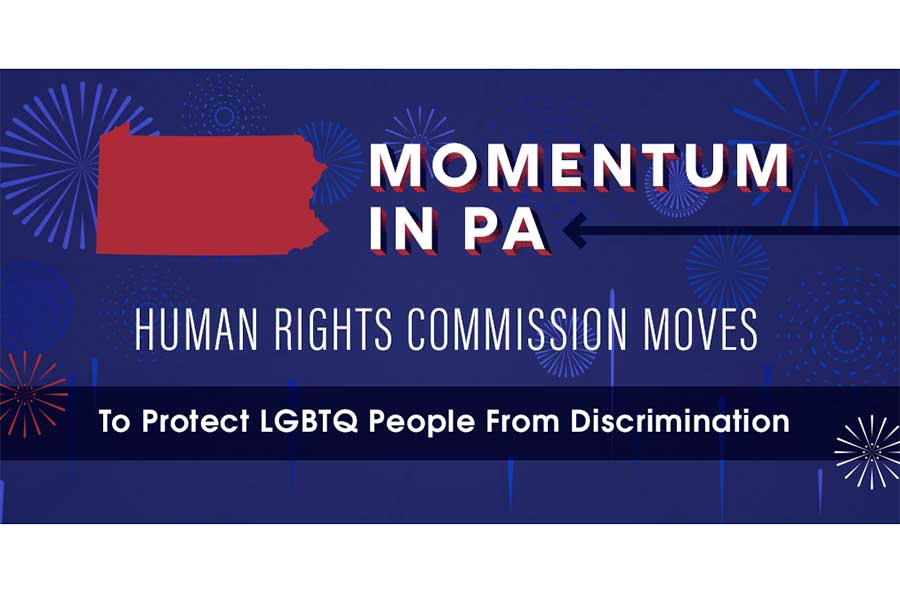Advocates are praising a recent decision by the Pennsylvania Human Relations Commission to accept LGBT antibias complaints as a form of sex discrimination.
In April 2017, the agency proposed guidance that would allow it to accept LGBT-related complaints, even though the state’s antibias law doesn’t explicitly cover sexual orientation and gender identity. In response to the proposed guidance, PHRC received about 8,000 comments from the public — many opposing the move.
But at a July 31 public meeting, PHRC commissioners gave the measure final approval in a 7-1 vote. Commissioner Gerald S. Robinson cast the lone “no” vote. He couldn’t be reached for comment.
“We are pleased to move forward with this guidance. It will help provide clarity to all Pennsylvanians regarding their rights,” said PHRC executive director Chad D. Lassiter in an Aug. 17 email.
The new guidance states that PHRC will investigate a complaint of LGBT discrimination as a sex-discrimination complaint. PHRC investigates antibias complaints in the areas of employment, housing, public accommodations, commercial property, and education. State and federal antibias laws explicitly ban sex discrimination in those areas.
Sara Rose, staff attorney at the ACLU of Pennsylvania, commended PHRC for approving the new guidance, noting that it extends antibias protections to people in the state who weren’t previously covered.
State Rep. Michael Schlossberg (D-Allentown) echoed Rose’s sentiments.
“This is necessary. For too long, LGBT Pennsylvanians have been subjected to discrimination without any remedy. However, this isn’t the final step forward, and it’s not enough. We must pass the LGBT Fairness Act now, in order to ensure that all LGBT Pennsylvanians can be free from discrimination in any public setting,” Schlossberg said.
Rue Landau, executive director of the Philadelphia Commission on Human Relations, also noted the need for a statewide LGBT-inclusive antibias law.
“We in Philadelphia have long known that laws prohibiting discrimination based on sexual orientation and gender identity in employment, housing, public accommodations and education are essential,” Landau said. “In our city, providing equal protection under the law for our LGBTQ community has created safer and stronger communities and a stronger economy. The PHRC’s guidance is a big step in the right direction for equal protection of LGBTQ individuals throughout the commonwealth. But it does not replace the need to enact comprehensive nondiscrimination legislation at the state level.”
Justin Robinette, a local civil-rights attorney, applauded PHRC for approving the new guidance.
“All LGBT discrimination is sex discrimination,” Robinette told PGN. “The guidance appears to recognize that fact. It’s in line with recent court rulings on the subject. As a civil-rights attorney who’s represented numerous victims of anti-LGBT bias, I intend to carefully monitor how PHRC implements its new guidance.”
But Jeremy L. Samek, senior legal counsel at the conservative Independence Law Center, based in Harrisburg, blasted the new guidance as “problematic, because similar laws have been applied broadly and without common-sense limitations, and have operated to take away liberties and protections that affect all of us, members in the LGBTQ community included,” he said in an Aug. 17 email.
PHRC is authorized by state law to investigate antibias complaints and to award financial damages to victims if their complaints are found to be substantiated. The agency has 75 staffers and an annual budget of more than $10 million.
The new measure means that SEPTA, the region’s public-transit agency, will be subjected to potential LGBT antibias complaints. SEPTA challenged the City of Philadelphia in court for nine years, from 2008-17, claiming it wasn’t subject to LGBT antibias complaints under the city’s antidiscrimination law. SEPTA contended that as a state agency, the PHRC had jurisdiction over it, while the Philadelphia Commission on Human Relations didn’t. The state Supreme Court ultimately ruled in favor of SEPTA, which has about 9,000 workers and about 4-million riders. A spokesperson for SEPTA had no comment about the new guidance.
